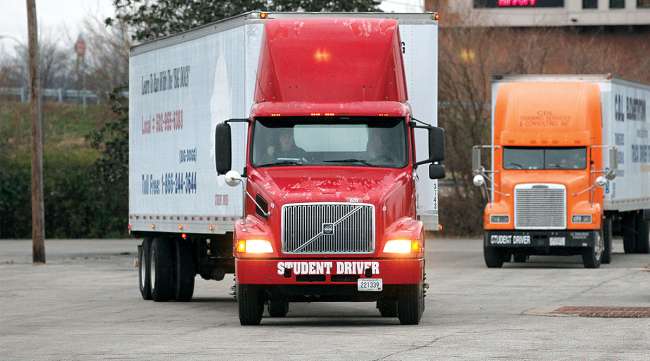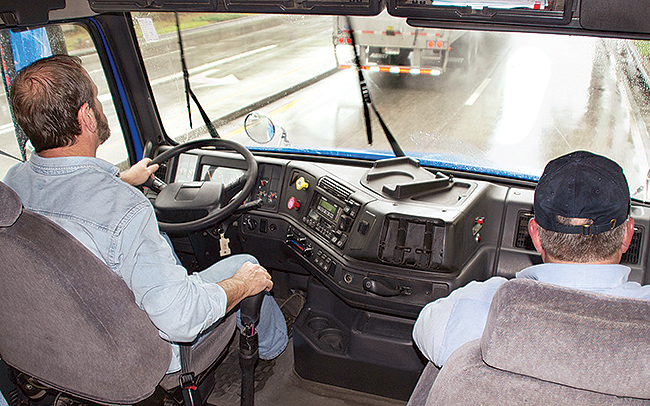Senior Reporter
Skills Testing Delays Cost US Economy $1.5 Billion, CVTA Study Says

Commercial driver skills testing delays are responsible for $1.5 billion in annual economic losses for the U.S. economy and more than 6.4 million days of delays for new drivers, according to new research commissioned by the Commercial Vehicle Training Association.
“Commercial vehicle drivers are in high demand by the trucking and bus industries,” CVTA said in a statement. “However, in many states, commercial learner permit holders, who must take and pass a skills test to secure their commercial driver licenses before going to work, are being prevented from sitting for this exam in a timely manner.”
The trade organization for CMV driver training schools said the reasons for the delays include a lack of behind-the-wheel testing appointments, testing personnel and test centers, according to the study made public Jan. 10.
Economic Impact of Wait Tim... by on Scribd
Drivers that possess commercial learning permits in states with state-run testing centers are experiencing the most significant testing backlogs, CVTA said.
“At the same time, permit holders in states with third-party testing centers, either in complement with state testing centers or third-party testing centers only, experience fewer delays and are more quickly able to enter the workforce,” the study concluded.
The study was conducted by ndp | analytics, a Washington-based strategic economic and communication research firm. Those conducting the research were Nam D. Pham, managing partner of the firm and Mary Donovan, a principal at ndp | analytics.
The analysis also concluded that $1.1 billion in direct lost wages can be attributed to testing delays, and federal and local governments lost out on over $342 million in income and sales tax revenue in 2016.
The study used data from 33 states, and the researchers estimated that nearly half of the approximately 669,688 initial CDL skills tests and retests experienced delays in 2016, totaling over 6.4 million days of delays.
With drivers in high demand, Congress has the opportunity to address this issue through a common-sense solution that requires third-party testing, ultimately eliminating skills testing delays.
— CVTA President Don Lefeve
“The testing delays have negative economic consequences to drivers, their families, communities, as well as federal, state and local governments. CDL permit holders waiting to take the skills test realize delays in getting a job and, subsequently, a paycheck,” the CVTA study said. “Without earnings, drivers do not have money to spend on daily activities which in turn support local businesses. Consequently, federal, state and local governments also forgo income and sales tax revenues.”
The CVTA study comes after a November Federal Motor Carrier Safety Administration survey concluded that in 2016 most states were experiencing few delays in scheduling entry-level truck drivers for their skills tests.
The calendar year 2016 FMCSA survey, delivered to Congress in September, was taken to determine the extent of delays new truck drivers are facing that industry stakeholders say contribute to a driver shortage and slow employment start dates for new drivers. The issue has been high on the list of concerns by the industry, which has for some time been experiencing critical shortages and is eager to put new drivers to work.

A student trains behind the wheel with his instructor. (Roadmaster Drivers School)
FMCSA concluded its report more than a year after the congressional deadline. An FMCSA spokesman said the CVTA report was under review, but declined further comment other than to say it is making funding available to help states speed up the wait times.
The agency’s survey showed that 30 of 46 states that responded had no scheduling delays in granting drivers their test date choices.
The state with the longest delays was New Jersey, which required drivers to wait 47 days for their skills tests. Drivers in Alaska had to wait 25 days, and in California it was 23.
However, CVTA was critical of the FMCSA survey, calling that agency’s data “incomplete.”
To obtain a commercial driver license, a student must first pass a written test to obtain a commercial learner permit. In all states, CLP holders must then wait at least 14 days to become eligible to take the behind-the-wheel skills test.
“With drivers in high demand, Congress has the opportunity to address this issue through a common-sense solution that requires third-party testing, ultimately eliminating skills testing delays,” said CVTA President Don Lefeve. “Our drivers, and our nation, cannot afford to be sidelined as a result of limited testing options.”





